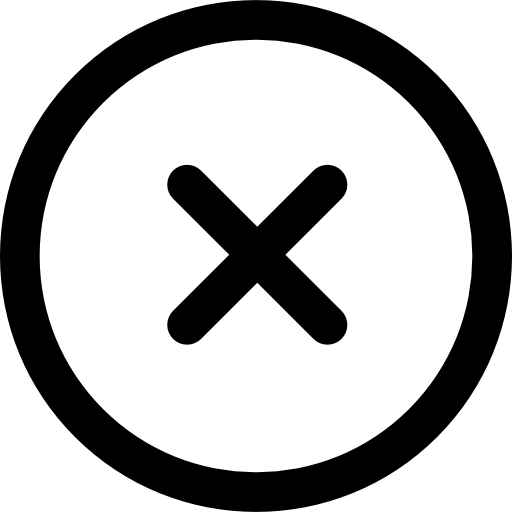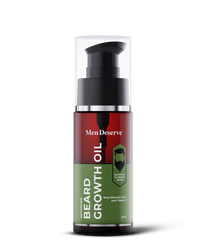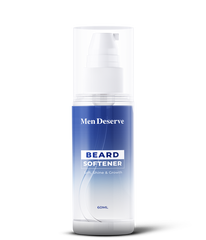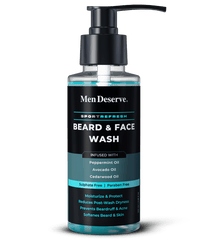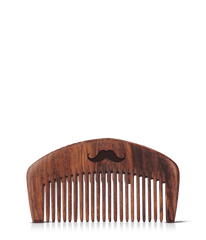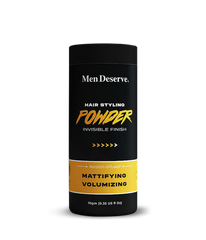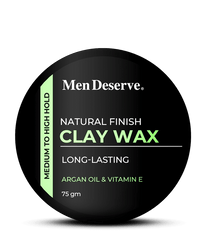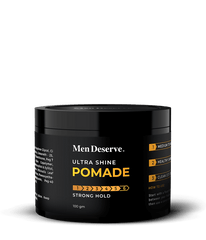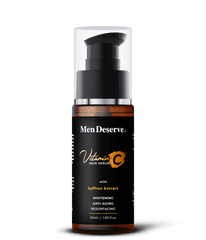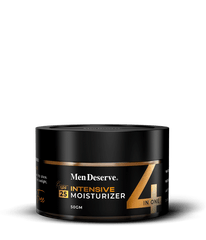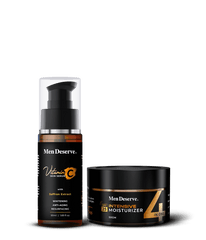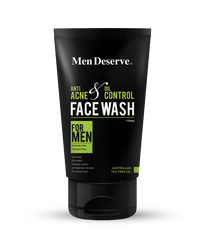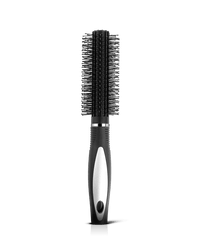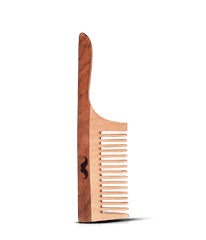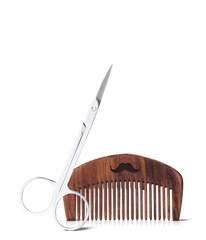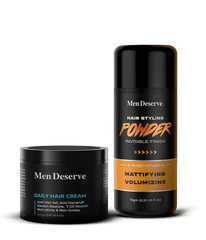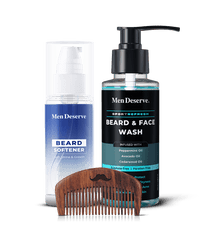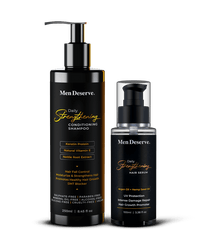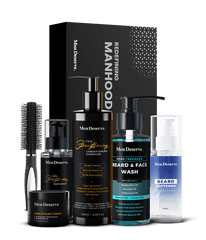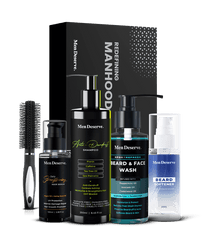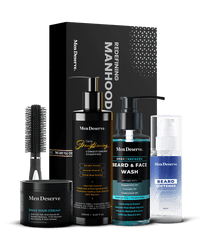Hair Fall for Men
Hair fall is a concern that plagues many men, impacting not just their physical appearance but also their confidence and self-esteem. While some degree of hair shedding is natural, excessive hair fall can be distressing.
However, the good news is that there are effective strategies and habits that men can adopt to combat this issue and maintain a healthy head of hair.
In this article, we'll explore some practical tips and tricks to help men control hair fall and promote stronger, thicker locks.
Causes: Hair Fall for Men

Before diving into solutions, it's essential to understand the underlying causes of hair fall. Several factors can contribute to this problem, including genetics, hormonal imbalances, stress, poor diet, scalp conditions, and excessive styling or grooming practices. Identifying the root cause can help tailor the approach to effectively address the issue.
Natural Ways: Reduce Hair Fall in Men

1. Maintain a Balanced Diet for Men

A nutritious diet is crucial for overall health, including the health of your hair. Ensure your diet includes plenty of protein, vitamins (especially B vitamins), minerals like iron and zinc, and essential fatty acids. Incorporate foods such as fish, eggs, nuts, leafy greens, and fruits into your meals to provide your hair with the nutrients it needs to stay strong and healthy.
2. Gentle Hair Care for Men

Avoid harsh hair treatments and excessive styling, as these can damage the hair follicles and contribute to hair fall. Opt for gentle hair fall control shampoo for male which is sulfate-free and conditioners formulated for your hair type, and try to limit the use of heated styling tools. Additionally, be mindful of how you towel dry and comb your hair to minimize breakage.
3. Stress Management for Men

Stress can wreak havoc on your body, including your hair health. Practice stress-management techniques such as meditation, yoga, deep breathing exercises, or engaging in hobbies you enjoy. Getting an adequate amount of sleep is also essential for reducing stress levels and promoting overall well-being.
4. Massage the Scalp for Men

Massaging the scalp stimulates blood flow to the hair follicles, promoting hair growth and reducing hair fall. Use your fingertips to gently massage the scalp in circular motions for a few minutes daily.
5. Proper Hydration for Men

Proper hydration is key for maintaining healthy hair. Drink plenty of water throughout the day to keep your body and scalp hydrated. Dehydration can make your hair more prone to breakage and hair fall, so make sure to prioritize hydration as part of your daily routine.
6. Regular Exercise for Men

Engage in regular physical activity to improve blood circulation, which delivers nutrients to the scalp and promotes hair growth. Aim for at least 30 minutes of moderate exercise most days of the week.
7. Essential Oils for Men

Some essential oils have been shown to promote hair growth and reduce hair fall. Examples include rosemary oil, peppermint oil, lavender oil, and cedarwood oil. Dilute the essential oil of your choice with a carrier oil (such as coconut oil or jojoba oil) and massage it into the scalp.
8. Aloe Vera for Men's Hair

Aloe vera has moisturizing and soothing properties that can help reduce scalp irritation and promote hair growth. Apply pure aloe vera gel directly to the scalp, leave it on for about 30 minutes, and then rinse it off with lukewarm water.
9. Herbal Remedies for Men Hairfall

Some herbal remedies, such as saw palmetto and stinging nettle, may help reduce hair loss by blocking the production of DHT, the hormone associated with male pattern baldness. However, it's essential to consult with a healthcare professional before using herbal supplements, especially if you have any underlying health conditions or are taking medications.
10. Healthy Lifestyle Habits for Men

Avoid smoking and excessive alcohol consumption, as they can negatively impact hair health. Get adequate sleep each night to support overall health and well-being, including hair growth.
While these natural remedies may help reduce hair fall, it's essential to be patient and consistent in their use. Results may vary from person to person, and it may take several weeks or months to see noticeable improvements in hair health. If you're experiencing severe or persistent hair loss, it's advisable to consult with a dermatologist or healthcare professional for personalized advice and treatment options.
Scientific Approaches: Reduce Hair Fall in Men
1. Medications for Hair

- Finasteride
Finasteride is an oral medication that works by blocking the conversion of testosterone into dihydrotestosterone (DHT), the hormone responsible for shrinking hair follicles in male pattern baldness. It's available by prescription and has been shown to slow down hair loss and promote hair regrowth in some men.
- Minoxidil
Minoxidil is a topical solution or foam applied directly to the scalp. It works by widening hair follicles and prolonging the growth phase of hair. Minoxidil is available over-the-counter and is typically applied twice daily. It's been shown to be effective in reducing hair loss and stimulating hair regrowth in some individuals.
2. Platelet-Rich Plasma (PRP) Therapy for Hair
Credit: Rejuvenate Hair and Skin
PRP therapy involves drawing a small amount of the patient's blood, processing it to concentrate the platelets, and then injecting the platelet-rich plasma into the scalp. Platelets contain growth factors that promote hair growth and tissue repair. PRP therapy has shown promise in reducing hair loss and stimulating hair regrowth in some individuals, although more research is needed to determine its long-term effectiveness.
3. Low-Level Laser Therapy (LLLT) for Hair
Low-Level Laser Therapy or LLLT, also known as red light therapy or cold laser therapy, involves exposing the scalp to low levels of red or near-infrared light. This light is thought to stimulate hair follicles and improve circulation in the scalp, leading to reduced hair loss and increased hair thickness. LLLT can be administered using specialized laser devices at home or in a clinical setting.
4. Hair Transplantation for Men
Hair transplantation involves surgically removing hair follicles from areas of the scalp where hair is thicker (donor sites) and implanting them into bald or thinning areas (recipient sites). Modern techniques such as follicular unit transplantation (FUT) and follicular unit extraction (FUE) have made hair transplantation more effective and natural-looking. Hair transplantation can provide permanent results, but it's essential to consult with a qualified dermatologist or hair transplant surgeon to determine candidacy and discuss expectations.
5. Nutritional Supplements for Men

Some nutritional supplements have been studied for their potential role in reducing hair loss and promoting hair growth. These may include biotin, vitamins (such as vitamin D and vitamin E), minerals (such as iron and zinc), and omega-3 fatty acids. However, it's essential to consult with a healthcare professional before starting any supplements, as excessive intake of certain nutrients can have adverse effects.
6. Scalp Micro-Pigmentation (SMP) for Hair
SMP is a non-surgical cosmetic procedure that involves tattooing tiny dots or lines onto the scalp to mimic the appearance of hair follicles. SMP can create the illusion of thicker hair and reduce the contrast between the scalp and hair, making hair loss less noticeable.
7. Prescription Shampoos and Treatments for Men

Certain prescription shampoos, foams, or lotions containing ingredients like ketoconazole or corticosteroids may help reduce inflammation, control dandruff, and promote hair growth in some individuals. These products are typically prescribed by dermatologists and may be used in conjunction with other treatments for best results.
8. Hair Care Products with Growth Factors for Men

Some hair care products contain growth factors, peptides, or other bioactive ingredients that claim to stimulate hair growth and reduce hair loss. While scientific evidence supporting their efficacy may be limited, some individuals may experience benefits from using these products.
It's essential to note that the effectiveness of these scientific or technical approaches to reduce hair fall may vary from person to person, and individual results may depend on factors such as the underlying cause of hair loss, genetics, and adherence to treatment protocols. Consulting with a dermatologist or hair loss specialist can help determine the most appropriate treatment options based on individual needs and goals.
Final Thoughts
Controlling hair fall is a multifaceted process that requires a combination of healthy lifestyle habits, proper hair care practices, and, in some cases, professional intervention. By following the tips outlined in this article and being proactive about your hair health, you can minimize hair fall and maintain a full, healthy-looking mane. Remember, consistency is key, so make these habits a regular part of your grooming routine for the best results. Here's to healthier, stronger hair for men everywhere.
FAQs: Hair Fall for Men
1. How can I stop my hair from falling male?
To stop hair fall in men, maintain a balanced diet rich in protein, vitamins and minerals, and avoid harsh hair treatments and excessive styling.
2. How will I stop my hair fall?
You can stop hair fall by practicing gentle hair care, managing stress effectively, staying hydrated and seeking professional advice if needed.
3. What causes hair fall in male?
Hair fall in men can be caused by various factors such as genetics, hormonal imbalances, stress, poor diet, scalp conditions and excessive styling or grooming practices.
4. What foods stop hairloss?
Foods that can help prevent hair loss include those high in protein, such as fish, eggs, and nuts, as well as foods rich in vitamins (especially B vitamins), minerals like iron and zinc, and essential fatty acids. Incorporate leafy greens, fruits, and healthy fats into your diet for optimal hair health.








